Atomic orbitals - Samenvattingen en Aantekeningen
Op zoek naar een samenvatting over Atomic orbitals? Op deze pagina vind je 968 samenvattingen over Atomic orbitals.
Pagina 4 van de 968 resultaten
Sorteer op
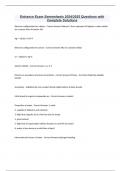
-
Entrance Exam Semmelweis 2024/2025 Questions with Complete Solutions
- Tentamen (uitwerkingen) • 28 pagina's • 2024
- Ook in voordeelbundel
-
 Winfred
Winfred
-
- $9.99
- + meer info
Entrance Exam Semmelweis 2024/2025 Questions with Complete Solutions Electron configuration for cations - Correct Answer Subtract 1 from exponent of highest n-value orbital (ex. remove from 4s before 3d) Ag+ = [Kr]5s^1 4d^9 Electron configuration for anions - Correct Answer Add 1 to closest orbital Cl- = [Ne]3s^2 3p^6 Atomic orbitals - Correct Answer s, p, d, f Primary vs secondary structures of proteins - Correct Answer Primary - AA chain (linked by peptide bonds) Secondary -...
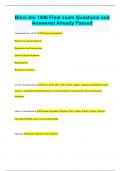
-
Blinn bio 1406 Final exam Questions and Answered Already Passed
- Tentamen (uitwerkingen) • 27 pagina's • 2024
-
 BESTSTUDYGURU
BESTSTUDYGURU
-
- $12.49
- + meer info
7 characteristics of life Cell and organization Energy use and metabolism Regulation and homeostasis Growth and development Reproduction Biological evolution Levels of organization Atoms, molecules, cells, tissues, organs, organism, population (same species), community(different species), ecosystem(species interacting with environment), biosphere order of classification Domain, Kingdom, Phylum, Class, Order, Family, Genus, Species Dear King Phillip came over for green Salad Genome gen...

-
CHM 1045 Final Exam Questions and Answers(A+ Solution guide)
- Tentamen (uitwerkingen) • 23 pagina's • 2024
- Ook in voordeelbundel
-
 PatrickKaylian
PatrickKaylian
-
- $8.39
- + meer info
4 concepts of Dalton's atomic theory and their correctness - 1. All matter is composed of indivisible particles (atoms) (can split atoms but this is generally correct) 2. atoms and indestructible and unchangeable (can change with extraneous outside methods, but still true) 3. all atoms of a given element are identical (false because of isotopes) 4. compounds are formed when atoms of different elements combine (true) absolute numbers - counts rather than measurements, conversion factors; i...
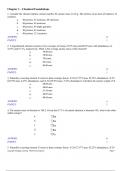
-
Test Bank for Chemistry An Atoms First Approach 2nd Edition by Steven S. Zumdahl, Susan A. Zumdahl, Donald J. DeCoste Chapter 1 - 21 Complete Guide
- Tentamen (uitwerkingen) • 674 pagina's • 2024
-
Ook in voordeelbundel
-
 MedGeek
MedGeek
-
- $19.99
- + meer info
Test Bank for Chemistry An Atoms First Approach 2nd Edition by Steven S. Zumdahl, Susan A. Zumdahl, Donald J. DeCoste Chapter 1 - 21 Complete Guide. Table of Content: Chemistry.1. Chemical Foundations.2. Atomic Structure and Periodicity.3. Bonding: General Concepts.4. Molecular Structure and Orbitals.5. Stoichiometry.6. Types of Chemical Reactions and Solution Stoichiometry.7. Chemical Energy.8. Gases.9. Liquids and Solids.10. Properties of Solutions.11. Chemical Kinetics.12. Chemical Equilibriu...
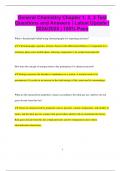
-
General Chemistry Chapter 1, 2, 3 Test Questions and Answers | Latest Update | 2024/2025 | 100% Pass
- Tentamen (uitwerkingen) • 32 pagina's • 2024
- Ook in voordeelbundel
-
 SterlingScores
SterlingScores
-
- $10.65
- + meer info
General Chemistry Chapter 1, 2, 3 Test Questions and Answers | Latest Update | 2024/2025 | 100% Pass What is the principle behind using chromatography for separating mixtures? Chromatography separates mixtures based on the differential affinities of compounds for a stationary phase and a mobile phase, allowing components to be isolated and analyzed. How does the concept of entropy relate to the spontaneity of a chemical reaction? Entropy measures the disorder or randomness in a sy...
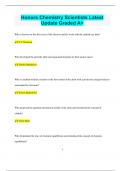
-
Honors Chemistry Scientists Latest Update Graded A+
- Tentamen (uitwerkingen) • 10 pagina's • 2024
- Ook in voordeelbundel
-
 StellarScores
StellarScores
-
- $9.99
- + meer info
Honors Chemistry Scientists Latest Update Graded A+ Who is known for the discovery of the electron and his work with the cathode ray tube? J.J. Thomson Who developed the periodic table and organized elements by their atomic mass? Dmitri Mendeleev Who is credited with the creation of the first model of the atom with a positively charged nucleus surrounded by electrons? Ernest Rutherford Who proposed the quantum mechanical model of the atom and introduced the concept of orbi...
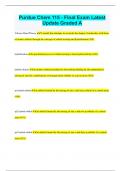
-
Purdue Chem 115 - Final Exam Latest Update Graded A
- Tentamen (uitwerkingen) • 29 pagina's • 2024
- Ook in voordeelbundel
-
 StellarScores
StellarScores
-
- $9.99
- + meer info
Purdue Chem 115 - Final Exam Latest Update Graded A Valence Bond Theory A model that attempts to reconcile the shapes of molecules with those of atomic orbitals through the concepts of orbital overlap and hybridization (429). hybridization a postulated process of orbital mixing to form hybrid orbitals (430). hybrid orbitals an atomic orbital postulated to form during binding by the mathematical mixing of specific combinations of nonequivalent orbitals on a given atom (430). sp hybrid...
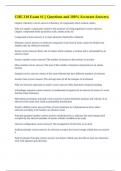
-
CHE 310 Exam #1 || Questions and 100% Accurate Answers.
- Tentamen (uitwerkingen) • 9 pagina's • 2024
-
Ook in voordeelbundel
-
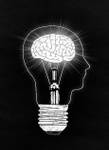 FullyFocus
FullyFocus
-
- $11.49
- + meer info
Organic chemistry correct answers Chemistry of compounds which contain carbon Why are organic compounds central to the structure of living organisms? correct answers Organic compounds make up nucleic acids, amino acids, etc. Compounds correct answers 2 or more elements chemically combined Elements correct answers A molecule composed of one kind of atom; cannot be broken into simpler units by chemical reactions. Atoms correct answers Basic unit of matter which contains a nucleus and i...
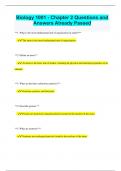
-
Biology 1001 - Chapter 2 Questions and Answers Already Passed
- Tentamen (uitwerkingen) • 9 pagina's • 2024
-
Ook in voordeelbundel
-
 BrilliantScores
BrilliantScores
-
- $9.99
- + meer info
Biology 1001 - Chapter 2 Questions and Answers Already Passed **1. What is the most fundamental unit of organization in matter?** - The atom is the most fundamental unit of organization. **2. Define an atom.** - An atom is the basic unit of matter, retaining the physical and chemical properties of an element. **3. What are the three subatomic particles?** - Neutrons, protons, and electrons. **4. Describe protons.** - Protons are positively charged particles located in t...

-
Test Bank for Chemistry An Atoms First Approach 2nd Edition by Steven S. Zumdahl, Susan A. Zumdahl, Donald J. DeCoste Chapter 1 - 21 Complete Guide
- Tentamen (uitwerkingen) • 674 pagina's • 2024
-
 AchieversHub
AchieversHub
-
- $19.99
- + meer info
Test Bank for Chemistry An Atoms First Approach 2nd Edition by Steven S. Zumdahl, Susan A. Zumdahl, Donald J. DeCoste Chapter 1 - 21 Complete Guide. Table of Content: Chemistry.1. Chemical Foundations.2. Atomic Structure and Periodicity.3. Bonding: General Concepts.4. Molecular Structure and Orbitals.5. Stoichiometry.6. Types of Chemical Reactions and Solution Stoichiometry.7. Chemical Energy.8. Gases.9. Liquids and Solids.10. Properties of Solutions.11. Chemical Kinetics.12. Chemical Equilibriu...

Wist je dat een verkoper gemiddeld €76 per maand verdient met het verkopen van samenvattingen? Hint, hint. Ontdek alles over verdienen op Stuvia


